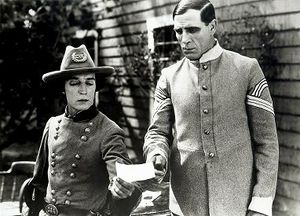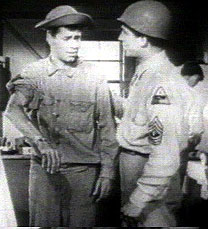User:Cap'n Ben/Eisenhower
Dwight David "Ike" Eisenhower (1890-1969) was the 34th President of the United States of America. Prior to becoming president, Eisenhower was a five-star general in the US Army Catering Corps, and played a vital role in creating the pies for the climactic pie-fight finale of World War II.
Eisenhower was born in, oh I don't know, Colorado or somewhere. Yeah, Colorado sounds good. His family belonged to a Mennonite sect that preached non-violence and non-comedy. This would lead to young Dwight breaking with his family religion when he went to the West Point and majored in pie throwing.
Military Career[edit | edit source]
“A career in the good old US Army! What more could a young man ask for?”
– Dwight D. Eisenhower on enrolling in West Point in 1913
“Oh, fuck.”
– Dwight D. Eisenhower on graduating from West Point in 1917
WWI[edit | edit source]
After attending West Point, Eisenhower became a Second Lieutenant in a field kitchen on the Western Front during World War I. It was here that he first met real life comedy soldiers, who were responsible for peeling potatoes after hilariously accidentally enraging their respective sergeants.
Although initially enthusiastic about his position, Eisenhower soon became disenchanted. The custard pies that the Americans were using at the front were vastly inferior to the more aerodynamic strudels that the German soldiers were throwing, leading to a great number of Americans being forced to stop in their tracks, blink, and wipe the pastry from one eye. Eisenhower brought this matter to the army brass, who laughed off his suggestions, pointing out that the American pie was still a far more humiliating weapon than the pear tarts being used by the French or the buckets of whitewash being employed by the Royal British Music Hall Brigade.
After lengthy conversations with George S. Patton - then a rising young officer in the Klown Kar Korps - Eisenhower resolved to remain in the Catering Corps after the war in order to create wackier ammunition for future US food fights.
Between the Wars[edit | edit source]
The Philippines[edit | edit source]
By the end of the war, Eisenhower had risen to the rank of captain. Declining an offer to train incompetent soldiers to turn the wrong way and thus hit each other with their rifle barrels, he opted to become assistant to General MacArthur. As commander of US forces in the Philippines, MacArthur's main task was creating ethnic jokes about the Filipinos. Eisenhower was reluctantly obliged to put his pies on the back burner [1], in order to carry out costly taxpayer funded research into the number of Filipinos it takes to change a light bulb. [2]
Upon the conclusion of this research, Eisenhower lobbied for and was granted a transfer to Fort Courage, where he would serve under the man who was to become his mentor, Gen. Buster Keaton
General Keaton[edit | edit source]
General Keaton was a comedy legend in the US forces. In the Great War, he had pioneered the use of tanks to drive through enemy chicken coops, fruit barrows and panes of sheet glass, but his career began far earlier. During Pershing's struggle against Pancho Villa, he inflicted severe defeat upon the guerrilla leader by using a false "Pancho Villa| mustache, and aping his walk. Earlier, during the Boxer Rebellion, he had personally lead the 3rd Dribble Cup Brigade during the assault on Hung Lo.
Eisenhower idolized his new commander, and resolved to learn all he could on the ancient art of humour in uniform. In particular, Eisenhower took to heart Keaton's theories about making certain that every platoon contained the right mix of "stock characters", including an angry sergeant, a shifty corporal, a rich guy (either a recent West point graduate or a reluctant draftee), and a dumb sonofabitch. Eisenhower tinkered with this basic pattern, adding some light ethnic comedy, usually involving a Scandinavian who pronounced the letter "J" as "Y".
Baking[edit | edit source]
Continuing his baking experiments on his own time, Eisenhower discovered a lightweight pastry that increased the range of American pies. Combined with Admiral Nimitz' development of the high-pressure seltzer bottle and General Doolittle's development of the pinata bomb was to help ensure the supremacy of America's comedic arsenal into the Television Age.
WWII[edit | edit source]
When the Second World War broke out after Hitler sold Stalin some shampoo that made his hair go a funny colour, Eisenhower was placed in overall charge of Allied forces in Europe. At the time, the situation was hilarious grim. German troops hilariously exaggerated goose stepping had forced French troops to pratfall back to Paris. The British expeditionary force was caught with its pants down (literally) and subjected to a series of devistating double entendres. The Nazis then turned their attention to Russia, then in the middle of a crippling joke shortage that ran from 1232-present.
Eisenhower realised that he had to turn the tide quickly. He soon realised that the Germans' biggest weaknesses was their tendency to believe than anybody dressed up as Hitler probably is Hitler, and had large numbers of Hitler impersonators parachuted into occupied territory.
With the Germans thus distracted, Eisenhower personally led a panty-raid on the Reichstag. The raid was a partial success, with many primary objectives attained; but Field Marshal Erwin "The Desert Fox" Rommel pursued the retreating raiders across Europe. The wiley Eisenhower escaped by jumping his staff jeep over a river. Rommel's tank was unable to make the jump, and a humiliated Rommel fell out of the driver's seat into the Rhine, yelling "Auch, Hundgegangen Es!" [3]
D-Day[edit | edit source]
With the conflict in Europe escalating out of control, Hitler confronted Eisenhower and suggested that the Axis and the Allies settle their differences at the annual D-Day inter-camp sports day on Lake Winnabola. Sportingly, Eisenhower agreed, knowing full well that the snooty kids of the Axis would not be playing fair, so he had his own people watching them. Thus, when Martin Borman put itching powder in the Allied sack-race sacks, General Patton cunningly switched sacks with the Axis. When Admiral Dönitz attempted to sneakily win the canoe race by torpedoing Allied canoes, he found his crew could barely move since Field Marshal Montgomery had replaced their uniforms with ones that were several sizes too small.
In spite of all this skulduggery, the score remained neck and neck until the eating contest. The Allies' champion eater Winston Churchill went head to head against Heinrich Himmler. Himmler was winning, until Eisenhower noticed that it wasn't really Himmler after all - it was Joseph Goebbels disguised in a fat suit that had a hollow front for storing food!
Naturally, Eisenhower declared "Food fight!" and the Allies emerged victorious.
Presidency[edit | edit source]
As President, he basically just played golf and took long naps. This was known as the Eisenhower doctrine.
Dwight D. Eisenhower in Popular Culture[edit | edit source]
Most references to Eisenhower in popular culture involve him either playing golf or taking long naps.
Dwight D. Eisenhower in Unpopular Culture[edit | edit source]
- Phillip Glass wrote an eighteen hour tone-poem entitled "Eisenhower: Warrior Golfer". Playing the CD is banned under the Geneva Convention.
- Carpet Burn Aficionado magazine named Eisenhower one of the "Top 100 People who wouldn't give us the time of day".
- The mascot of Gor Fandom Anonymous is a chibi-Eisenhower called "Ikey".
- Goatse.cx may or may not have said something about Eisenhower; but I'm not about to check.




